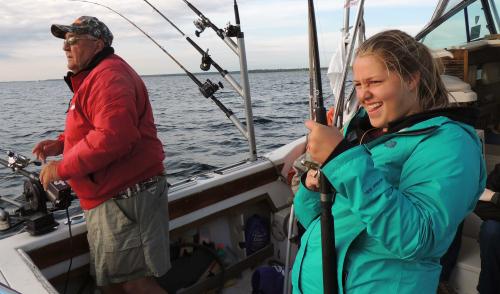2015 Lake Huron workshops offer latest research, updates about the Lake Huron fishery
Lake Huron fisheries workshops bring communities together with fisheries scientists and managers to discuss new research findings, fishing trends, and management updates.

The Lake Huron fishery has witnessed dramatic ecological changes recently resulting from introductions and impacts of aquatic invasive species. Much has been done by scientists and management agencies working with anglers and coastal communities to understand and respond to these ecosystem changes. In spite of the challenges brought on by invasive species, Lake Huron has proven resilient and (with help) continues to offer a diverse and valuable fishery.
And a great year of fishing it was on Lake Huron. Fishing with Trout Scout and Wipe Out charter captains, youth, as part of the 4-H Great Lakes and Natural Resources Camp, enjoyed fishing northern Lake Huron last August. On any given day they were not only hooking ample amounts of fish but a striking diversity of species as well - Chinook, Atlantic, and Pink salmon caught alongside Steelhead, Lake Trout, and Walleye. To the south, Saginaw Bay anglers reported fantastic fishing and limits of Walleye throughout the season – but wondered about a Yellow Perch fishery that seems to still suffer. Lake Huron anglers gearing up for spring fishing opportunities may be wondering if these trends will continue during the coming fishing season.
Several educational opportunities exist this spring to explore the status and health, trends and fishing opportunities offered in Lake Huron directly from the fisheries experts who gather this information.

Youth enjoy catching a diversity of fish species with Lake Huron charter captains during the 4-H Great Lakes and Natural Resource Camp. Nick Baumgart | Michigan State University Extension.
2015 Lake Huron Fisheries Workshops: A chance to learn more, you are invited to participate!
This spring, Michigan Sea Grant and Michigan State University Extension, in partnership with the Michigan Department of Natural Resources Fisheries Division, USGS Great Lakes Science Center, and local fishery organizations will be hosting three evening regional workshops across Lake Huron’s coastline. Workshops are free and open to the public, and will provide valuable information for anglers, charter captains, resource professionals and other community members interested in the status of the fishery.
Workshop dates and locations include:
- Oscoda: April 23, 2015 (Thursday, 6–9 p.m.) at Camp Inn Lodge, 3111 US-23 South, Oscoda Township, MI 48750
- Cedarville: April 28, 2015 (Tuesday, 6–9 p.m.) at Les Cheneaux Sportsman’s Club M-134, Cedarville, MI 49719
- Bay City: April 30, 2015 (Thursday, 6–9 p.m.) at Knights of Columbus Hall, 360 S. River Rd. (M-13), Bay City, MI 48708
Topics will include information and updates regarding fish populations and angler catch data, forage or prey fish surveys, recovering native Lake Trout populations, status of Saginaw Bay Walleye and Yellow Perch, habitat restoration efforts, updates on fisheries management activities, among many other Lake Huron related topics of local interest. Of highlight this year will be a focus on Saginaw Bay fish and their habitats, including an overview of possible future management options that could allow anglers to benefit from a healthy and growing Walleye population. Also a look at a new Saginaw Bay reef habitat project partnership being led by Michigan Department of Environmental Quality Office of the Great Lakes and Purdue University, among other partners.
These workshops are a valuable networking and educational opportunity for all involved:
- Recreational anglers have the opportunity to become more scientific anglers – learning about feeding trends of predator fish species may prove valuable in deciding where to fish or what lures to put into play while fishing this year.
- Fishery businesses – sportfishing charters, commercial fishing, and bait shops – gain insights relating to Lake Huron fisheries resources around which their business depends. This information may prove useful in adapting business strategies, ranging from fishing practices to business marketing.
- Research and management agencies share informational updates, and in trade value insights and input through this dialogue with anglers and community stakeholders on various fisheries management topics. The effectiveness of fisheries research and management are enhanced through these collaborations.
Workshops are open to the public at no cost to participants; however, pre-registration is requested. You are invited to register online to participate in any (or all) of these educational opportunities.
For program information or questions, contact Brandon Schroeder, Michigan Sea Grant by email or at 989-354-9885. Workshop details are also available online on the Michigan Sea Grant website.



 Print
Print Email
Email




